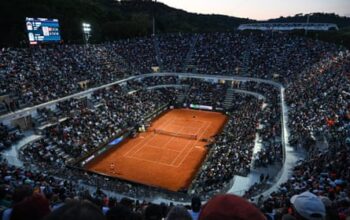
On a hot spring day in Munich, I went to a small movie theatre in the basement of an apartment building, dreading the prospect of missing an evening in the setting sun, possibly with a Bavarian beer in hand. The whole city seemed to be anxiously anticipating the upcoming Champions League semi-final between Bayern Munich and Real Madrid. People roamed the streets, trying to find a place to watch football with their friends.
I, on the other hand, was on my way to see Luca Guadagnino’s new movie, Challengers. I was ready to see it fail. For context, I played on the tennis tour for 16 years and retired at the US Open two years ago. You’ve probably never heard of me. There are two reasons for that. With perfect timing, I retired at the same time as Serena Williams. Reason number two: I never had Serena’s career. It’s OK. One can thrive in so many other ways.
I am saying this so you can understand why I was ready to hate Challengers. It was not only because it was a beautiful night and I was sitting in a basement, it was also because I was traumatized by all the tennis movies that had come beforehand. Not all of them are bad (although some are) but they depict tennis in ways that are at times wrong, and at other times laughable. Kirsten Dunst testing the tightness of her strings by tapping the racket frame only for a string to break at precisely that moment in the movie Wimbledon haunts me to this day. Who allowed that to happen?
I will admit that sports movies are hard to pull off. Too often, they rely on that one cathartic moment when it all comes together and the protagonist’s struggles are forgotten in victory. To make it worthwhile, those struggles are layered on thick and any eventual triumph is plastered with sentiment. A dad crying in the audience, a coach nodding approvingly, both beaming with pride, the teammates elated, the opponent humiliated. As if a broken childhood can be mended by winning a game which, if we’re honest, means very little compared to nearly everything else in life.
Challengers is not that. It is something entirely different and, spoiler alert (to continue the film jargon), I loved it. I never thought I would write these words, but it’s a very sexy sports movie. Which is interestingly the only thing it gets wrong about tennis. Tennis can be graceful, even beautiful when played by the right person, but sexy it is not. Maybe I just did it all wrong, but what’s in the past shall remain in the past.
Challengers gets every other detail about tennis right, as if the film itself had played on tour for 10-plus years. I gasped when I saw the Pete Sampras-era chequered Nike shorts Patrick Zweig (Josh O’Connor) wears, a staple in any challenger player’s wardrobe – they were sturdy and indestructible, a requirement when you barely have enough money to pay for a hotel. I laughed out loud when I spotted the familiar sight of Kinesio Tape running down Art Donaldson’s (Mike Faist) neck. Not to mention Tashi’s (Zendaya) perfectly braided ponytail when she is still a tennis prodigy swapped for a chin length blow-out when she becomes a coach; I have seen countless friends and colleagues go for a radical haircut when they retire or are hit by injury.
The plot, and proceed no further if you don’t want it spoiled, is told rather quickly. Three junior players work tirelessly to become stars while grappling with something all teenagers grapple with: hormones. Two boys desire one girl … and possibly each other. Eating each other’s churros (um, yes) should be a dead giveaway but I’ll leave it at that. Patrick has all the talent but trouble being serious with it. Art plays unspectacular percentage tennis but has the work ethic. Tashi has both talent and discipline. She has another thing the men lack: fervor and passion, dedication and love for the game. Tashi dates Patrick but eventually, after a gory injury (seriously, look away) ends her dream, marries Art and becomes his coach. You see how that would cause tension between Patrick and Art who, of course, end up playing each other in the final of a challenger. From the depiction of rooms in soulless chain hotels to the court branding, from the white chairs for the fans to the officials’ clothing, from nobody batting an eyelash in the locker room while one of their peers goes haywire on a tennis racket to Tashi’s perfect WAG Chanel espadrilles, the production design deserves a place, if not at the Oscars, then at least in the Tennis Hall of Fame.
The tennis itself is good but not perfect. While the actors do a more than commendable job on court, it’s obvious to a former professional that they didn’t play tennis seriously as kids. Faist gets closest to making it work but that’s possibly because he looks a lot like David Goffin, a former top-10 player. Zendaya’s movie star appeal is stronger than any tennis technique could ever be. The secret hero of the movie, however, is O’Connor and his devilish charisma. You just can’t take your eyes off him and his crooked little smirk.
I have always liked Guadagnino’s movies and I was worried when I heard he was set on making a tennis one. But he has pulled it off. I would venture as far as to call it genius. Only people who have spent decades around tennis, whether as a player or coach, an official or a fan, know the secrets the sport reveals when you’re crazy enough to stick with it. Every win comes with a loss and every loss comes with a win. Art wins a career but in doing so loses the girl. Patrick loses a career that could have been but wins the girl. Only the girl loses it all. Tashi should have known, the one thing you cannot allow yourself to do in tennis is give it your heart. It will crush it like a bug. Guadagnino seems to know that.
I would need more room to extol the brilliance of the Trent Reznor/Atticus Ross soundtrack, the innovative way the matches are filmed and how the three main characters are very specific tennis archetypes. It’s not the best movie I have ever seen. But it is the best tennis movie. Maybe even the best sports movie. Sorry, Moneyball.
-
Andrea Petkovic is an author and a former world top-10 tennis player.



